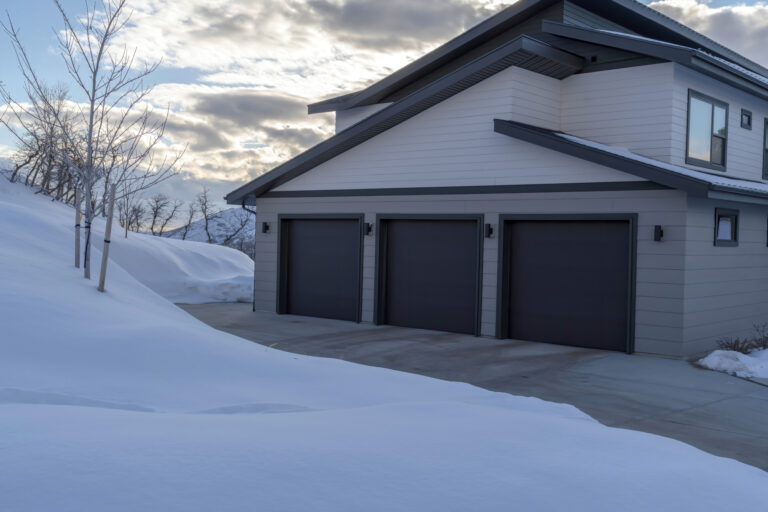As winter sets in, garage doors can face a few challenges due to the harsh weather conditions. Nothing is worse than having a malfunctioning garage door when it’s cold out. Low temperatures and snow buildup can cause several common issues that may interrupt how your garage door functions. Here are five problems and their practical solutions to help you avoid any garage door troubles during the cold months.
1. Contracted Metal Parts
One of the most common garage door issues during winter is the contraction of its metal parts. The cold temperature causes the tracks, rollers, hinges, and other components of the garage door to shrink, which can affect the door’s alignment and balance. As a result, the contraction can lead to operational problems, making it difficult for the door to move smoothly along its tracks.
To prevent contracting from happening, it is important to regularly check and oil the metal parts. If you notice any misalignment or issues with the tracks, our professional experts can help find the problem and repair your garage door.
2. Lubrication Issues
In very low temperatures, the lubricants used in the garage door system to keep it functioning smoothly can thicken up and become less effective. When there isn’t enough oil to lubricate the parts of the door, several problems can happen, such as difficulty opening and closing the garage door, strange noises, or the door not working at all.
To avoid this issue, opt for high-quality silicone-based lubricants that will not thicken even in freezing temperatures. Before applying the oil, make sure to clean any metal components that have noticeable dirt and debris, such as rollers, hinges, and springs, to ensure the lubricant works effectively.
3. Damaged Weatherstripping
The rubber weatherstripping at the bottom of your garage door serves as a barrier to keep extreme weather conditions out of your garage. However, in winter, the weatherstripping may freeze to the ground, obstructing your garage door’s movement and leaving gaps that allow cold air and moisture to get inside.
Regularly check your weatherstripping to make sure it is in good condition to do its job. Check for any cracks or signs of wear and tear in the rubber. If it is damaged or worn, replace it to maintain an effective seal. Applying a silicone-based lubricant to the weatherstripping can also prevent it from freezing or cracking.
4. Broken Springs
It’s helpful to know that the metal components of garage door springs, which are typically made of high-tensile steel, become more rigid and brittle as the temperature drops. The springs are responsible for counterbalancing the door’s weight, and if they fail, the door may become difficult to open or may not open at all.
Attempting to handle spring replacements without professional expertise can be dangerous since these components are under high tension and can cause injuries or further damage. That’s why it’s a good idea to schedule a professional inspection of your garage door springs before the winter season. If any signs of wear or damage are detected, have them replaced promptly to ensure your garage door functions as it should. American Garage Door’s preventative maintenance can help you address any potential issues before they cause more significant problems.
5. Frozen Door
If you live in an area with extremely low temperatures, your garage door may freeze shut – literally. This issue happens when moisture on the door accumulates and freezes, forming a barrier that will prevent the door from moving. The problem can get worse if you try to force the door open, which could cause significant damage to the door.
To keep your door from freezing shut, it is important to keep your garage door clean and dry by regularly removing any snow or ice buildup on its surface. Again, if the door is already frozen shut, you should avoid trying to force it open. Instead, use a gentle heating method, such as a space heater or warm air, to melt the ice slowly.

Worry-Free Winter
With winter officially underway, it is critical to take proactive measures to avoid these common garage door issues and ensure your door’s reliable performance and longevity. Regular inspections, proper lubrication, and timely repairs are necessary to prevent and address these challenges. These measures not only enhance your garage door’s efficiency during the colder months but also prevent more significant problems from arising.
If you come across any other complex issues or are unsure about any aspect of your garage door’s condition, don’t hesitate to contact us. We offer 24/7 emergency service in Denver and are always ready to help your garage door withstand the winter season. Stay warm and worry-free!
